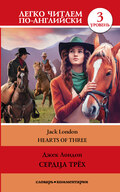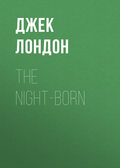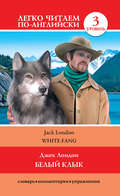
Джек Лондон
Adventure
As Sheldon looked at him the thought came to his mind that after all there might be something in the other’s wild adventures over the earth. It required a man of that calibre, a man capable of obtruding a duel into orderly twentieth century life, to find such wild adventures.
“There’s only one way to stop me,” Tudor went on. “I can’t insult you directly, I know. You are too easy-going, or cowardly, or both, for that. But I can narrate for you the talk of the beach – ah, that grinds you, doesn’t it? I can tell you what the beach has to say about you and this young girl running a plantation under a business partnership.”
“Stop!” Sheldon cried, for the other was beginning to vibrate and oscillate before his eyes. “You want a duel. I’ll give it to you.” Then his common-sense and dislike for the ridiculous asserted themselves, and he added, “But it’s absurd, impossible.”
“Joan and David – partners, eh? Joan and David – partners,” Tudor began to iterate and reiterate in a malicious and scornful chant.
“For heaven’s sake keep quiet, and I’ll let you have your way,” Sheldon cried. “I never saw a fool so bent on his folly. What kind of a duel shall it be? There are no seconds. What weapons shall we use?”
Immediately Tudor’s monkey-like impishness left him, and he was once more the cool, self-possessed man of the world.
“I’ve often thought that the ideal duel should be somewhat different from the conventional one,” he said. “I’ve fought several of that sort, you know – ”
“French ones,” Sheldon interrupted.
“Call them that. But speaking of this ideal duel, here it is. No seconds, of course, and no onlookers. The two principals alone are necessary. They may use any weapons they please, from revolvers and rifles to machine guns and pompoms. They start a mile apart, and advance on each other, taking advantage of cover, retreating, circling, feinting – anything and everything permissible. In short, the principals shall hunt each other – ”
“Like a couple of wild Indians?”
“Precisely,” cried Tudor, delighted. “You’ve got the idea. And Berande is just the place, and this is just the right time. Miss Lackland will be taking her siesta, and she’ll think we are. We’ve got two hours for it before she wakes. So hurry up and come on. You start out from the Balesuna and I start from the Berande. Those two rivers are the boundaries of the plantation, aren’t they? Very well. The field of the duel will be the plantation. Neither principal must go outside its boundaries. Are you satisfied?”
“Quite. But have you any objections if I leave some orders?”
“Not at all,” Tudor acquiesced, the pink of courtesy now that his wish had been granted.
Sheldon clapped his hands, and the running house-boy hurried away to bring back Adamu Adam and Noa Noah.
“Listen,” Sheldon said to them. “This man and me, we have one big fight to-day. Maybe he die. Maybe I die. If he die, all right. If I die, you two look after Missie Lackalanna. You take rifles, and you look after her daytime and night-time. If she want to talk with Mr. Tudor, all right. If she not want to talk, you make him keep away. Savvee?”
They grunted and nodded. They had had much to do with white men, and had learned never to question the strange ways of the strange breed. If these two saw fit to go out and kill each other, that was their business and not the business of the islanders, who took orders from them. They stepped to the gun-rack, and each picked a rifle.
“Better all Tahitian men have rifles,” suggested Adamu Adam. “Maybe big trouble come.”
“All right, you take them,” Sheldon answered, busy with issuing the ammunition.
They went to the door and down the steps, carrying the eight rifles to their quarters. Tudor, with cartridge-belts for rifle and pistol strapped around him, rifle in hand, stood impatiently waiting.
“Come on, hurry up; we’re burning daylight,” he urged, as Sheldon searched after extra clips for his automatic pistol.
Together they passed down the steps and out of the compound to the beach, where they turned their backs to each other, and each proceeded toward his destination, their rifles in the hollows of their arms, Tudor walking toward the Berande and Sheldon toward the Balesuna.
CHAPTER XXVII – MODERN DUELLING
Barely had Sheldon reached the Balesuna, when he heard the faint report of a distant rifle and knew it was the signal of Tudor, giving notice that he had reached the Berande, turned about, and was coming back. Sheldon fired his rifle into the air in answer, and in turn proceeded to advance. He moved as in a dream, absent-mindedly keeping to the open beach. The thing was so preposterous that he had to struggle to realize it, and he reviewed in his mind the conversation with Tudor, trying to find some clue to the common-sense of what he was doing. He did not want to kill Tudor. Because that man had blundered in his love-making was no reason that he, Sheldon, should take his life. Then what was it all about? True, the fellow had insulted Joan by his subsequent remarks and been knocked down for it, but because he had knocked him down was no reason that he should now try to kill him.
In this fashion he covered a quarter of the distance between the two rivers, when it dawned upon him that Tudor was not on the beach at all. Of course not. He was advancing, according to the terms of the agreement, in the shelter of the cocoanut trees. Sheldon promptly swerved to the left to seek similar shelter, when the faint crack of a rifle came to his ears, and almost immediately the bullet, striking the hard sand a hundred feet beyond him, ricochetted and whined onward on a second flight, convincing him that, preposterous and unreal as it was, it was nevertheless sober fact. It had been intended for him. Yet even then it was hard to believe. He glanced over the familiar landscape and at the sea dimpling in the light but steady breeze. From the direction of Tulagi he could see the white sails of a schooner laying a tack across toward Berande. Down the beach a horse was grazing, and he idly wondered where the others were. The smoke rising from the copra-drying caught his eyes, which roved on over the barracks, the tool-houses, the boat-sheds, and the bungalow, and came to rest on Joan’s little grass house in the corner of the compound.
Keeping now to the shelter of the trees, he went forward another quarter of a mile. If Tudor had advanced with equal speed they should have come together at that point, and Sheldon concluded that the other was circling. The difficulty was to locate him. The rows of trees, running at right angles, enabled him to see along only one narrow avenue at a time. His enemy might be coming along the next avenue, or the next, to right or left. He might be a hundred feet away or half a mile. Sheldon plodded on, and decided that the old stereotyped duel was far simpler and easier than this protracted hide-and-seek affair. He, too, tried circling, in the hope of cutting the other’s circle; but, without catching a glimpse of him, he finally emerged upon a fresh clearing where the young trees, waist-high, afforded little shelter and less hiding. Just as he emerged, stepping out a pace, a rifle cracked to his right, and though he did not hear the bullet in passing, the thud of it came to his ears when it struck a palm-trunk farther on.
He sprang back into the protection of the larger trees. Twice he had exposed himself and been fired at, while he had failed to catch a single glimpse of his antagonist. A slow anger began to burn in him. It was deucedly unpleasant, he decided, this being peppered at; and nonsensical as it really was, it was none the less deadly serious. There was no avoiding the issue, no firing in the air and getting over with it as in the old-fashioned duel. This mutual man-hunt must keep up until one got the other. And if one neglected a chance to get the other, that increased the other’s chance to get him. There could be no false sentiment about it. Tudor had been a cunning devil when he proposed this sort of duel, Sheldon concluded, as he began to work along cautiously in the direction of the last shot.
When he arrived at the spot, Tudor was gone, and only his foot-prints remained, pointing out the course he had taken into the depths of the plantation. Once, ten minutes later, he caught a glimpse of Tudor, a hundred yards away, crossing the same avenue as himself but going in the opposite direction. His rifle half-leaped to his shoulder, but the other was gone. More in whim than in hope of result, grinning to himself as he did so, Sheldon raised his automatic pistol and in two seconds sent eight shots scattering through the trees in the direction in which Tudor had disappeared. Wishing he had a shot-gun, Sheldon dropped to the ground behind a tree, slipped a fresh clip up the hollow butt of the pistol, threw a cartridge into the chamber, shoved the safety catch into place, and reloaded the empty clip.
It was but a short time after that that Tudor tried the same trick on him, the bullets pattering about him like spiteful rain, thudding into the palm trunks, or glancing off in whining ricochets. The last bullet of all, making a double ricochet from two different trees and losing most of its momentum, struck Sheldon a sharp blow on the forehead and dropped at his feet. He was partly stunned for the moment, but on investigation found no greater harm than a nasty lump that soon rose to the size of a pigeon’s egg.
The hunt went on. Once, coming to the edge of the grove near the bungalow, he saw the house-boys and the cook, clustered on the back veranda and peering curiously among the trees, talking and laughing with one another in their queer falsetto voices. Another time he came upon a working-gang busy at hoeing weeds. They scarcely noticed him when he came up, though they knew thoroughly well what was going on. It was no affair of theirs that the enigmatical white men should be out trying to kill each other, and whatever interest in the proceedings might be theirs they were careful to conceal it from Sheldon. He ordered them to continue hoeing weeds in a distant and out-of-the-way corner, and went on with the pursuit of Tudor.
Tiring of the endless circling, Sheldon tried once more to advance directly on his foe, but the latter was too crafty, taking advantage of his boldness to fire a couple of shots at him, and slipping away on some changed and continually changing course. For an hour they dodged and turned and twisted back and forth and around, and hunted each other among the orderly palms. They caught fleeting glimpses of each other and chanced flying shots which were without result. On a grassy shelter behind a tree, Sheldon came upon where Tudor had rested and smoked a cigarette. The pressed grass showed where he had sat. To one side lay the cigarette stump and the charred match which had lighted it. In front lay a scattering of bright metallic fragments. Sheldon recognized their significance. Tudor was notching his steel-jacketed bullets, or cutting them blunt, so that they would spread on striking – in short, he was making them into the vicious dum-dum prohibited in modern warfare. Sheldon knew now what would happen to him if a bullet struck his body. It would leave a tiny hole where it entered, but the hole where it emerged would be the size of a saucer.
He decided to give up the pursuit, and lay down in the grass, protected right and left by the row of palms, with on either hand the long avenue extending. This he could watch. Tudor would have to come to him or else there would be no termination of the affair. He wiped the sweat from his face and tied the handkerchief around his neck to keep off the stinging gnats that lurked in the grass. Never had he felt so great a disgust for the thing called “adventure.” Joan had been bad enough, with her Baden-Powell and long-barrelled Colt’s; but here was this newcomer also looking for adventure, and finding it in no other way than by lugging a peace-loving planter into an absurd and preposterous bush-whacking duel. If ever adventure was well damned, it was by Sheldon, sweating in the windless grass and fighting gnats, the while he kept close watch up and down the avenue.
Then Tudor came. Sheldon happened to be looking in his direction at the moment he came into view, peering quickly up and down the avenue before he stepped into the open. Midway he stopped, as if debating what course to pursue. He made a splendid mark, facing his concealed enemy at two hundred yards’ distance. Sheldon aimed at the centre of his chest, then deliberately shifted the aim to his right shoulder, and, with the thought, “That will put him out of business,” pulled the trigger. The bullet, driving with momentum sufficient to perforate a man’s body a mile distant, struck Tudor with such force as to pivot him, whirling him half around by the shock of its impact and knocking him down.
“’Hope I haven’t killed the beggar,” Sheldon muttered aloud, springing to his feet and running forward.
A hundred feet away all anxiety on that score was relieved by Tudor, who made shift with his left hand, and from his automatic pistol hurled a rain of bullets all around Sheldon. The latter dodged behind a palm trunk, counting the shots, and when the eighth had been fired he rushed in on the wounded man. He kicked the pistol out of the other’s hand, and then sat down on him in order to keep him down.
“Be quiet,” he said. “I’ve got you, so there’s no use struggling.”
Tudor still attempted to struggle and to throw him off.
“Keep quiet, I tell you,” Sheldon commanded. “I’m satisfied with the outcome, and you’ve got to be. So you might as well give in and call this affair closed.”
Tudor reluctantly relaxed.
“Rather funny, isn’t it, these modern duels?” Sheldon grinned down at him as he removed his weight. “Not a bit dignified. If you’d struggled a moment longer I’d have rubbed your face in the earth. I’ve a good mind to do it anyway, just to teach you that duelling has gone out of fashion. Now let us see to your injuries.”
“You only got me that last,” Tudor grunted sullenly, “lying in ambush like – ”
“Like a wild Indian. Precisely. You’ve caught the idea, old man.” Sheldon ceased his mocking and stood up. “You lie there quietly until I send back some of the boys to carry you in. You’re not seriously hurt, and it’s lucky for you I didn’t follow your example. If you had been struck with one of your own bullets, a carriage and pair would have been none too large to drive through the hole it would have made. As it is, you’re drilled clean – a nice little perforation. All you need is antiseptic washing and dressing, and you’ll be around in a month. Now take it easy, and I’ll send a stretcher for you.”
CHAPTER XXVIII – CAPITULATION
When Sheldon emerged from among the trees he found Joan waiting at the compound gate, and he could not fail to see that she was visibly gladdened at the sight of him.
“I can’t tell you how glad I am to see you,” was her greeting. “What’s become of Tudor? That last flutter of the automatic wasn’t nice to listen to. Was it you or Tudor?”
“So you know all about it,” he answered coolly. “Well, it was Tudor, but he was doing it left-handed. He’s down with a hole in his shoulder.” He looked at her keenly. “Disappointing, isn’t it?” he drawled.
“How do you mean?”
“Why, that I didn’t kill him.”
“But I didn’t want him killed just because he kissed me,” she cried.
“Oh, he did kiss you!” Sheldon retorted, in evident surprise. “I thought you said he hurt your arm.”
“One could call it a kiss, though it was only on the end of the nose.” She laughed at the recollection. “But I paid him back for that myself. I boxed his face for him. And he did hurt my arm. It’s black and blue. Look at it.”
She pulled up the loose sleeve of her blouse, and he saw the bruised imprints of two fingers.
Just then a gang of blacks came out from among the trees carrying the wounded man on a rough stretcher.
“Romantic, isn’t it?” Sheldon sneered, following Joan’s startled gaze. “And now I’ll have to play surgeon and doctor him up. Funny, this twentieth-century duelling. First you drill a hole in a man, and next you set about plugging the hole up.”
They had stepped aside to let the stretcher pass, and Tudor, who had heard the remark, lifted himself up on the elbow of his sound arm and said with a defiant grin, —
“If you’d got one of mine you’d have had to plug with a dinner-plate.”
“Oh, you wretch!” Joan cried. “You’ve been cutting your bullets.”
“It was according to agreement,” Tudor answered. “Everything went. We could have used dynamite if we wanted to.”
“He’s right,” Sheldon assured her, as they swung in behind. “Any weapon was permissible. I lay in the grass where he couldn’t see me, and bushwhacked him in truly noble fashion. That’s what comes of having women on the plantation. And now it’s antiseptics and drainage tubes, I suppose. It’s a nasty mess, and I’ll have to read up on it before I tackle the job.”
“I don’t see that it’s my fault,” she began. “I couldn’t help it because he kissed me. I never dreamed he would attempt it.”
“We didn’t fight for that reason. But there isn’t time to explain. If you’ll get dressings and bandages ready I’ll look up ‘gun-shot wounds’ and see what’s to be done.”
“Is he bleeding seriously?” she asked.
“No; the bullet seems to have missed the important arteries. But that would have been a pickle.”
“Then there’s no need to bother about reading up,” Joan said. “And I’m just dying to hear what it was all about. The Apostle is lying becalmed inside the point, and her boats are out to wing. She’ll be at anchor in five minutes, and Doctor Welshmere is sure to be on board. So all we’ve got to do is to make Tudor comfortable. We’d better put him in your room under the mosquito-netting, and send a boat off to tell Dr. Welshmere to bring his instruments.”
An hour afterward, Dr. Welshmere left the patient comfortable and attended to, and went down to the beach to go on board, promising to come back to dinner. Joan and Sheldon, standing on the veranda, watched him depart.
“I’ll never have it in for the missionaries again since seeing them here in the Solomons,” she said, seating herself in a steamer-chair.
She looked at Sheldon and began to laugh.
“That’s right,” he said. “It’s the way I feel, playing the fool and trying to murder a guest.”
“But you haven’t told me what it was all about.”
“You,” he answered shortly.
“Me? But you just said it wasn’t.”
“Oh, it wasn’t the kiss.” He walked over to the railing and leaned against it, facing her. “But it was about you all the same, and I may as well tell you. You remember, I warned you long ago what would happen when you wanted to become a partner in Berande. Well, all the beach is gossiping about it; and Tudor persisted in repeating the gossip to me. So you see it won’t do for you to stay on here under present conditions. It would be better if you went away.”
“But I don’t want to go away,” she objected with rueful countenance.
“A chaperone, then – ”
“No, nor a chaperone.”
“But you surely don’t expect me to go around shooting every slanderer in the Solomons that opens his mouth?” he demanded gloomily.
“No, nor that either,” she answered with quick impulsiveness. “I’ll tell you what we’ll do. We’ll get married and put a stop to it all. There!”
He looked at her in amazement, and would have believed that she was making fun of him had it not been for the warm blood that suddenly suffused her cheeks.
“Do you mean that?” he asked unsteadily. “Why?”
“To put a stop to all the nasty gossip of the beach. That’s a pretty good reason, isn’t it?”
The temptation was strong enough and sudden enough to make him waver, but all the disgust came back to him that was his when he lay in the grass fighting gnats and cursing adventure, and he answered, —
“No; it is worse than no reason at all. I don’t care to marry you as a matter of expedience – ”
“You are the most ridiculous creature!” she broke in, with a flash of her old-time anger. “You talk love and marriage to me, very much against my wish, and go mooning around over the plantation week after week because you can’t have me, and look at me when you think I’m not noticing and when all the time I’m wondering when you had your last square meal because of the hungry look in your eyes, and make eyes at my revolver-belt hanging on a nail, and fight duels about me, and all the rest – and – and now, when I say I’ll marry you, you do yourself the honour of refusing me.”
“You can’t make me any more ridiculous than I feel,” he answered, rubbing the lump on his forehead reflectively. “And if this is the accepted romantic programme – a duel over a girl, and the girl rushing into the arms of the winner – why, I shall not make a bigger ass of myself by going in for it.”
“I thought you’d jump at it,” she confessed, with a naïveté he could not but question, for he thought he saw a roguish gleam in her eyes.
“My conception of love must differ from yours then,” he said. “I should want a woman to marry me for love of me, and not out of romantic admiration because I was lucky enough to drill a hole in a man’s shoulder with smokeless powder. I tell you I am disgusted with this adventure tomfoolery and rot. I don’t like it. Tudor is a sample of the adventure-kind – picking a quarrel with me and behaving like a monkey, insisting on fighting with me – ‘to the death,’ he said. It was like a penny dreadful.”
She was biting her lip, and though her eyes were cool and level-looking as ever, the tell-tale angry red was in her cheeks.
“Of course, if you don’t want to marry me – ”
“But I do,” he hastily interposed.
“Oh, you do – ”
“But don’t you see, little girl, I want you to love me,” he hurried on. “Otherwise, it would be only half a marriage. I don’t want you to marry me simply because by so doing a stop is put to the beach gossip, nor do I want you to marry me out of some foolish romantic notion. I shouldn’t want you.. that way.”
“Oh, in that case,” she said with assumed deliberateness, and he could have sworn to the roguish gleam, “in that case, since you are willing to consider my offer, let me make a few remarks. In the first place, you needn’t sneer at adventure when you are living it yourself; and you were certainly living it when I found you first, down with fever on a lonely plantation with a couple of hundred wild cannibals thirsting for your life. Then I came along – ”
“And what with your arriving in a gale,” he broke in, “fresh from the wreck of the schooner, landing on the beach in a whale-boat full of picturesque Tahitian sailors, and coming into the bungalow with a Baden-Powell on your head, sea-boots on your feet, and a whacking big Colt’s dangling on your hip – why, I am only too ready to admit that you were the quintessence of adventure.”
“Very good,” she cried exultantly. “It’s mere simple arithmetic – the adding of your adventure and my adventure together. So that’s settled, and you needn’t jeer at adventure any more. Next, I don’t think there was anything romantic in Tudor’s attempting to kiss me, nor anything like adventure in this absurd duel. But I do think, now, that it was romantic for you to fall in love with me. And finally, and it is adding romance to romance, I think.. I think I do love you, Dave – oh, Dave!”
The last was a sighing dove-cry as he caught her up in his arms and pressed her to him.
“But I don’t love you because you played the fool to-day,” she whispered on his shoulder. “White men shouldn’t go around killing each other.”
“Then why do you love me?” he questioned, enthralled after the manner of all lovers in the everlasting query that for ever has remained unanswered.
“I don’t know – just because I do, I guess. And that’s all the satisfaction you gave me when we had that man-talk. But I have been loving you for weeks – during all the time you have been so deliciously and unobtrusively jealous of Tudor.”
“Yes, yes, go on,” he urged breathlessly, when she paused.
“I wondered when you’d break out, and because you didn’t I loved you all the more. You were like Dad, and Von. You could hold yourself in check. You didn’t make a fool of yourself.”
“Not until to-day,” he suggested.
“Yes, and I loved you for that, too. It was about time. I began to think you were never going to bring up the subject again. And now that I have offered myself you haven’t even accepted.”
With both hands on her shoulders he held her at arm’s-length from him and looked long into her eyes, no longer cool but seemingly pervaded with a golden flush. The lids drooped and yet bravely did not droop as she returned his gaze. Then he fondly and solemnly drew her to him.
“And how about that hearth and saddle of your own?” he asked, a moment later.
“I well-nigh won to them. The grass house is my hearth, and the Martha my saddle, and – and look at all the trees I’ve planted, to say nothing of the sweet corn. And it’s all your fault anyway. I might never have loved you if you hadn’t put the idea into my head.”
“There’s the Nongassla coming in around the point with her boats out,” Sheldon remarked irrelevantly. “And the Commissioner is on board. He’s going down to San Cristoval to investigate that missionary killing. We’re in luck, I must say.”
“I don’t see where the luck comes in,” she said dolefully. “We ought to have this evening all to ourselves just to talk things over. I’ve a thousand questions to ask you.”
“And it wouldn’t have been a man-talk either,” she added.
“But my plan is better than that.” He debated with himself a moment. “You see, the Commissioner is the one official in the islands who can give us a license. And – there’s the luck of it – Doctor Welshmere is here to perform the ceremony. We’ll get married this evening.”
Joan recoiled from him in panic, tearing herself from his arms and going backward several steps. He could see that she was really frightened.
“I.. I thought.” she stammered.
Then, slowly, the change came over her, and the blood flooded into her face in the same amazing blush he had seen once before that day. Her cool, level-looking eyes were no longer level-looking nor cool, but warmly drooping and just unable to meet his, as she came toward him and nestled in the circle of his arms, saying softly, almost in a whisper, —
“I am ready, Dave.”






